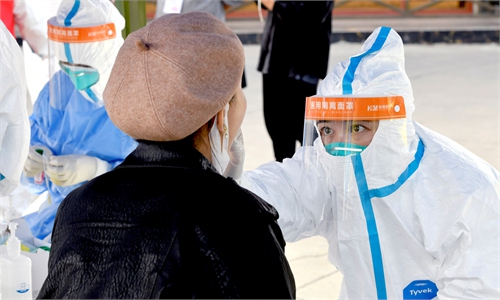
Residents in Lhasa, capital of Southwest China's Xizang (Tibet) Autonomous Region, line up to take COVID-19 nucleic acid tests on August 9, 2022. Photo: VCG
Lhasa, capital of Southwest China's Xizang (Tibet) Autonomous Region, announced Sunday the removal of three health officials, including officials from the city's Health Commission and the Center for Disease Control (CDC), for inadequate implementation of epidemic prevention work.
So far, eight officials have been removed from office in Xizang. On Friday, five officials were removed from the city of Xigaze for the same reason.
The wave of outbreaks experienced in Xizang has received greater attention as several Chinese provinces have recently been swept by COVID-19 outbreaks. On Saturday, 502 cases of infection were reported in Xizang. As of Saturday night, Xizang had reported a total of 678 infections since the start of the current outbreak. Prior to this outbreak, only one case of COVID-19 infection had been reported in Xizang in the past two years.
According to Red Star News, people who test positive in Xizang will be put under management as asymptomatic infections without a second test, as Xizang is a vast and sparsely populated country with low atmospheric pressure and lack of oxygen in many areas, and it takes longer to review nucleic acid test results for a second time, which may delay isolation and treatment.
Based on the number of new cases reported daily, Xizang's epidemic situation is still on the rise, Li Jingzhong, director of the Xizang Autonomous Region CDC, told CCTV on Saturday.
At present, epidemiological investigation and traceability of the outbreak in Xizang is being carried out in an orderly manner, Li said. Judging from the epidemiological investigation and biological characteristics of the virus strain, the virus' transmission into Xizang may take many forms, with transmission through people or objects a possibility, and further investigation is needed.
Currently, makeshift hospitals in Lhasa, Xigaze, Ngari, Qamdo and Nyingchi are being used, playing an important role in epidemic control, Li said.
Xizang is carrying out region-wide nucleic acid screening. Three rounds of nucleic acid screening in Lhasa have been basically completed and arrangements are being made to deploy the fourth round. Through multiple rounds of nucleic acid screening, potential sources of infection are expected to be eliminated soon.
Global Times

